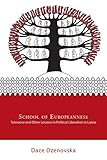School of Europeanness : Tolerance and Other Lessons in Political Liberalism in Latvia / Dace Dzenovska.
Material type: TextPublisher: Ithaca, NY : Cornell University Press, [2018]Copyright date: ©2018Description: 1 online resource (276 p.) : 4 b&w halftonesContent type:
TextPublisher: Ithaca, NY : Cornell University Press, [2018]Copyright date: ©2018Description: 1 online resource (276 p.) : 4 b&w halftonesContent type: - 9781501716867
- Liberalism -- Latvia
- Minorities -- Latvia
- Post-communism -- Latvia
- Toleration -- Political aspects -- Latvia
- Anthropology
- Political Science & Political History
- West European History
- SOCIAL SCIENCE / Anthropology / Cultural & Social
- Eastern Europe, nationalism, liberalism, postsocialism, minorities, migration
- 320.51094796 23
- JN6739.A15
- online - DeGruyter
| Item type | Current library | Call number | URL | Status | Notes | Barcode | |
|---|---|---|---|---|---|---|---|
 eBook
eBook
|
Biblioteca "Angelicum" Pont. Univ. S.Tommaso d'Aquino Nuvola online | online - DeGruyter (Browse shelf(Opens below)) | Online access | Not for loan (Accesso limitato) | Accesso per gli utenti autorizzati / Access for authorized users | (dgr)9781501716867 |
Frontmatter -- Contents -- Preface -- Acknowledgments -- Introduction. Paradox of Europeanness -- 1. Pride and Shame -- 2. The State People and Their Minorities -- 3. Knowing Subjects and Partial Understandings -- 4. Building Up and Tearing Down -- 5. Language Sacred and Language Injurious -- 6. Repression and Redemption -- Epilogue -- Notes -- References -- Index
restricted access online access with authorization star
http://purl.org/coar/access_right/c_16ec
In School of Europeanness, Dace Dzenovska argues that Europe’s political landscape is shaped by a fundamental tension between the need to exclude and the requirement to profess and institutionalize the value of inclusion. Nowhere, Dzenovska writes, is this tension more glaring than in the former Soviet Republics.Using Latvia as a representative case, School of Europeanness is a historical ethnography of the tolerance work undertaken in that country as part of postsocialist democratization efforts. Dzenovska contends that the collapse of socialism and the resurgence of Latvian nationalism gave this Europe-wide logic new life, simultaneously reproducing and challenging it. Her work makes explicit what is only implied in the 1977 Kraftwerk song, "Europe Endless": hierarchies prevail in European public and political life even as tolerance is touted by politicians and pundits as one of Europe’s chief virtues.School of Europeanness shows how post–Cold War liberalization projects in Latvia contributed to the current crisis of political liberalism in Europe, providing deep ethnographic analysis of the power relations in Latvia and the rest of Europe, and identifying the tension between exclusive polities and inclusive values as foundational of Europe’s political landscape.
Mode of access: Internet via World Wide Web.
In English.
Description based on online resource; title from PDF title page (publisher's Web site, viewed 26. Apr 2024)


